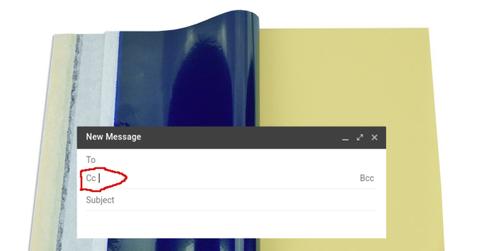The "CC” Email Term Is a Throwback That Predates Computer Usage
Published Nov. 16 2021, 2:36 p.m. ET
Modern technology is filled with a lot of references to "legacy" business usage terms that have long gone the way of the fax machine. For example, the universal "save" icon that has become synonymous with backing up our data is a floppy disk, and there are probably a lot of youngsters out there who've never seen one of those measly plastic bits of storage, let alone held one in their hand.
And if you weren't aware, "CC" is also a reference to a bygone bit of tech folks used to implement in their businesses. So what does CC mean in email?
What does "CC" mean in an email?
You probably know what it is to "CC" someone on an email: You want to make sure that they're involved in the conversation and they have a copy of the correspondence that you're having with someone else. But have you ever thought about what the "CC" stands for?
No, it's not just a random term, but a reference to "Carbon Copy."
What is a "carbon copy"?
Back in the olden days before we could save, copy, and paste typed-up correspondence, there was a handy little invention called carbon copy paper.
It's become obsolete in this day and age, but you still probably come into contact with it at some restaurants or during particular sales transactions.
The carbon sheet on the bottom is used as the "copy" or "receipt" slip that is a mirror image of everything written on the sheet above it. It's basically a quick and easy way to instantly copy anything that's written down on the paper. Have an itemized receipt that you want to give to your boss for incidentals on a business trip? You have a copy of everything you spent and they signed off on the reimbursement in case there are any questions from accounting down the line.
Or maybe you're taking down notes for a meeting and you've got a carbon copy pad that have multiple "copy slips" underneath it. Those carbon copies are an effective and quick way to make sure that you've got several copies at hand to disseminate to everyone with just a quick tear of the page.
Sure, you could always head to a copy machine, or, you know, type it up in a shared Google Doc or send it to folks in an email, but carbon copies were an important business tool back in the day, especially in lines of work that didn't rely heavily on computer systems for their tracking/commerce.
Generally speaking, CC'ing someone on an email is to make them aware of the communications and to keep them "abreast" of specific developments, according to Right Inbox. CC'ing an individual also implies that they don't necessarily need to provide a response, either.
If you do want someone to respond, then you should probably just include their name in the "to" field of an email and call it a day. No need over-complicating things.
What does "BCC" mean?
It stands for "Blind Carbon Copy," which basically means that you can send an en masse email to a large group of people without others seeing who else has been attached to the email. It's best to use this as a form of mass communication or if you're sending out messaging to a large group of folks and don't want them to start an annoying email response chain.
BCC is a great tool to use to reduce inbox clutter for all parties involved, although if you're sharing specific information that could be considered sensitive, utilizing this option may freak some people out, as they don't know who just read what you wrote.
